They Fled Domestic Violence in a Pandemic. Then Came the Winter Storm.
Domestic abuse survivors in Dallas are facing trauma on top of trauma.
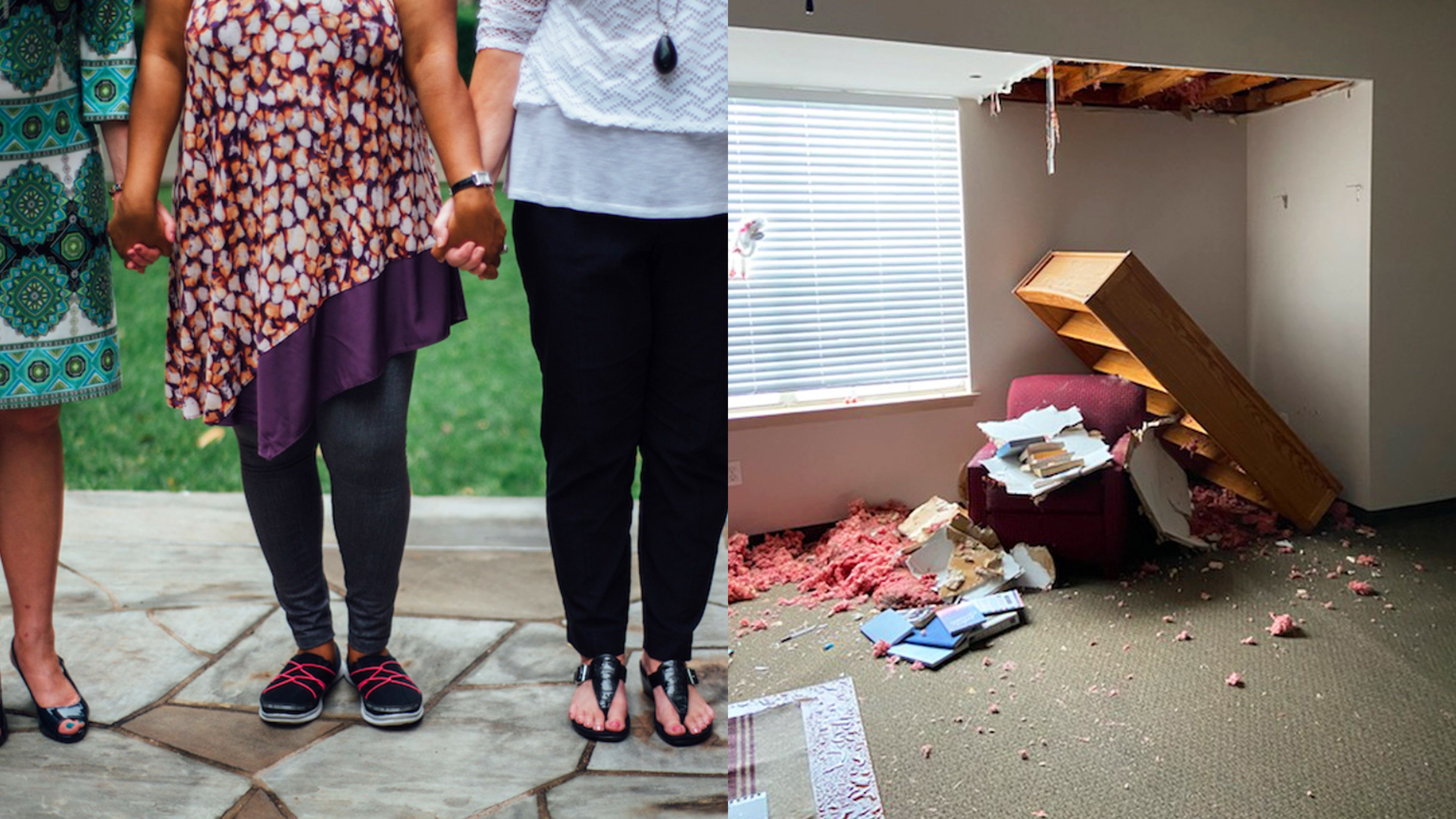

On Saturday, February 13, Genesis Women’s Shelter in Dallas lost power as a deadly winter storm descended on Texas. The electromagnetic locks on their buildings stopped working—locks meant to keep abusers out, meant to keep the 87 women and children living inside safe. These families had survived unimaginable violence and suffering, had taken the difficult step to leave their abusers in the midst of a pandemic, and now they couldn’t even lock their front doors.
The safe campus consists of a shelter offering temporary safety to women in an emergency situation, as well as a transitional housing unit with 18 individual apartments, Annie’s House, for those needing a place to live for up to a year.
After Genesis lost power, staff members passed out flashlights, batteries, blankets, coats, and mittens. Power would intermittently come on and then shut off again, leaving children as young as 3 months old without heat. By Tuesday, counselors had begun establishing safety plans with the women, determining a place they could go where their abusers wouldn’t think to look. But, for a woman to choose to go to a shelter in a pandemic, it often means they have no other option. Many of Genesis’ clients are of low socioeconomic status and can’t afford alternate housing. Genesis did what it could to place the majority of the women and children in safe places; five families were left hunkering down at the transitional housing unit.
Around 7:00 a.m. on Wednesday, Krista Fultz, the shelter’s director of education and advocacy, received a call from her director. One of the women at Annie’s House had called to say water was leaking into her apartment from the ceiling. Krista lived nearby and had grown up in Indiana, so she felt like she could manage the icy roads to get to the campus.
“When I got there, water was pouring out of both of the light fixtures in front of the double doors,” says Fultz. “The water on the ground was already freezing, slick and icy.”
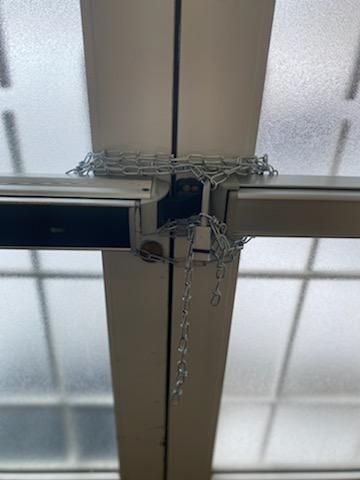
The doors to Genesis had to be chained shut after the power outage left the shelter without its electromagnetic locks.
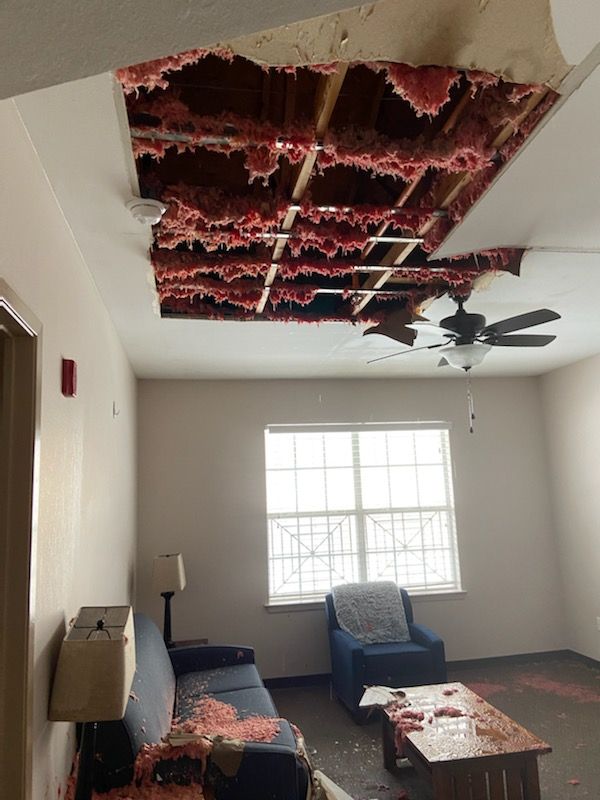
Water damaged every apartment in Genesis’ transitional housing unit, where women live to get away from their abusers.
Fultz called their maintenance worker, who was home sick with COVID. He sent her to the electrical room where she opened the door to find water gushing on to live electrical equipment—it was one of the rare times when the power was actually on. Fultz remembers being terrified as they used FaceTime to walk her through the water shut-off process.
The apartments were still actively flooding. With the fire alarm blaring, Fultz knocked on every door to evacuate the remaining residents. One woman answered the door holding a broom. She’d been trying to sweep the water out of her apartment as it spilled down.
Stay In The Know
Get exclusive access to fashion and beauty trends, hot-off-the-press celebrity news, and more.
The water had torn through some of the ceilings, leaving insulation exposed and ruining the survivors’ belongings. “Every apartment had water. I basically said, ‘Grab your important documents, things that are irreplaceable, and we need to get out of this building.’ ”
Fultz brought the families, about a dozen women and children, including a one-year-old baby, to the dining room of the now-empty shelter across campus. She put out breakfast, coffee, and hot cocoa, handing out board games and legos while calling coworkers to come help. Then, the power went out again.
The families—wet, cold, and traumatized—sat in masks and tried to social distance as much as possible.
Since the world is still in the midst of the pandemic, hard evidence quantifying the effects COVID-19 has had on domestic abuse is difficult to find. What experts do know is that events causing great stress, financial hardships, and people being locked down together lead to an increase in and greater intensity of domestic abuse incidents. Natural disasters often cause an uptick in domestic violence. Countries around the world have documented a spike in reports of domestic violence during COVID-19, leading the United Nations to refer to it as a “shadow pandemic.” Researcher Katerina Standish compared Google search results in the U.S. from March–August in 2019 and 2020: “How to hit a woman so no one knows,” was searched 163 million times during the pandemic, an increase of 31 percent. “He will kill me,” increased by 84 percent from 2019.
“A lot of our Black clients don’t feel comfortable calling the police,” and undocumented clients don’t have access to COVID-19 stimulus checks or unemployment.
Beth Meeks works at the National Network to End Domestic Violence. She’s been responsible for helping domestic violence shelters across the country coordinate responses to the issues that arise with COVID-19. “In a number of locations we have seen an increase in services provided,” says Meeks. She’s heard anecdotal reports of abused women avoiding hospitals because they didn’t want to overwhelm the system. “They didn’t go to the ER until they were in a very dire situation,” she says. Last August, a hospital in Boston reported an increase in severe injuries to domestic violence victims, with more damage to deep internal organs.
One in three women experience intimate partner violence, and it disproportionately affects the most marginalized people, especially communities of color. The majority of the families evacuated from Genesis are BIPOC. Incidentally, COVID-19 has been particularly damaging to these groups as well. The intersectionality leaves survivors extremely vulnerable.
“A lot of our Black clients don’t feel comfortable calling the police,” says Fultz. She talks about undocumented clients who don’t have access to COVID-19 stimulus checks or unemployment. A common tactic of abusers is taking away a victim’s financial independence, so they aren’t able to leave.
In the past year, Genesis has been operating at complete capacity. The majority of their clients have been determined to be at “high risk of lethality” from their abuser and are coming from a situation of extreme violence.
Amber Nealy is the assistant director of clinical and professional services at Genesis. She says safety planning during COVID has been especially difficult, and her counselors must get very creative with individualized plans for their clients.
“Some women are not wanting to go into any shelter because of fear of getting the virus,” says Nealy. There are women who may have been planning to leave who had to put their plans on hold because of the extra financial and childcare barriers. There are children who can’t do Zoom counseling sessions because their father is home, listening. Nealy talks about a woman who, pre-pandemic, would lie to her spouse that she was going to do laundry and then come to Genesis for a counseling session. “Now she can’t, because the laundromat is closed,” says Nealy.
Advocates have put together Google documents with resources, including places with free WiFi, say a Lowe’s parking lot, where victims can go and safely sit and do a telehealth counseling session or submit a protective order. They give tips like, keep a Starbucks cup in your car so you can say you were getting coffee.
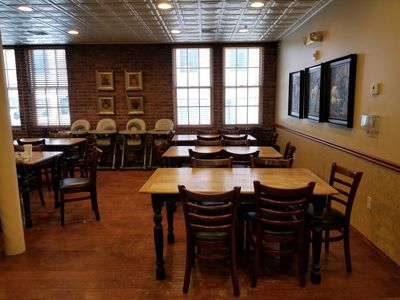
The dining room of Genesis, where families were evacuated to when the apartments in the transitional housing unit were destroyed.
COVID itself is being used as a weapon of abuse. Nealy has had several clients whose abusers are COVID-deniers and prohibit them from using a face mask or hand sanitizer. Other abusers use being stuck at home as a way to watch their partner’s every move. Fultz recalls one abuser who rearranged his home office so that he could look out the front window. That way he could see when the postal worker arrived with his partner’s check, then deposit it himself and not let her have the funds.
The most perilous time for a survivor of domestic violence is when they are leaving their abuser. The 87 women and children who were evacuated due to the winter storm have all surmounted so many obstacles, including taking that most dangerous step. They did it in the midst of a pandemic. In the past year, four babies were born and taken home to Genesis. These women are survivors, in every sense of the word.
“They have been living in ongoing traumatic stress for long before we met them,” says Nealy. “These new traumas have compounded their previous trauma.”
Fultz adds that she’s heartbroken for the clients in the transitional housing units whose new homes are now unliveable. “Coming to transitional housing is giving them a bit of safety and security in a time of pandemic and fleeing from super abusive partners. That was all ripped out from under them in a matter of days.”
One such survivor is a refugee, who fled her home country with her family and then suffered physical and sexual abuse from her husband while in Texas. Fultz says that on Wednesday, the mother was holding one of her young children on her hip while packing their belongings. The ceiling in her apartment had collapsed and furniture was damaged. The Genesis staff had secured the family a hotel with the help of another organization, Family Gateway. The mother was nervous because she’d never driven in snow before; the staff tried to give her tips and show her on Google Maps how to get to the hotel.
Fultz brought the two school-age children with her to the shelter’s kitchen to fill up a bag of snacks for their trip. She said they were thrilled when she opened the pantry, expressing particular excitement for the Cheetos. Unprompted, they made sure to pick out chocolate that they knew their mom liked, in the hopes of helping her out.
As they were walking out, bag stuffed with snacks, the older sister turned to her sibling and said, “I’m really going to miss this place.”
“I wanted to yell out to her, ‘No, you’re going to come back! You’re going to be okay!’ ” says Fultz. “But I don’t know what’s going to happen.”
The Genesis staff has been working tirelessly, many of them without power themselves, to place their clients in safe spaces. This was the first time in their 35-year history that they had to close. Genesis CEO Jan Langbein said her biggest fear has been that a child talking to their father will accidentally mention a landmark they see from their hotel window. Langbein says besides her safety concerns, she has been comforted by how generous the community has been. “We’re going to fix it,” she says, confidently.
The shelter reopened on Saturday, Feb. 20, but the transitional housing units could be closed for months. For those looking to help, Genesis is accepting donations. Prince Harry and Meghan Markle, via their Archewell Foundation, have already pledged to replace the roof on the transitional housing unit.
If you or someone you know is being abused, you can seek anonymous, confidential help at the National Domestic Violence hotline: 1-800-799-7233 (SAFE).
This story has been updated to include the number of apartments at Annie's House.
RELATED STORIES

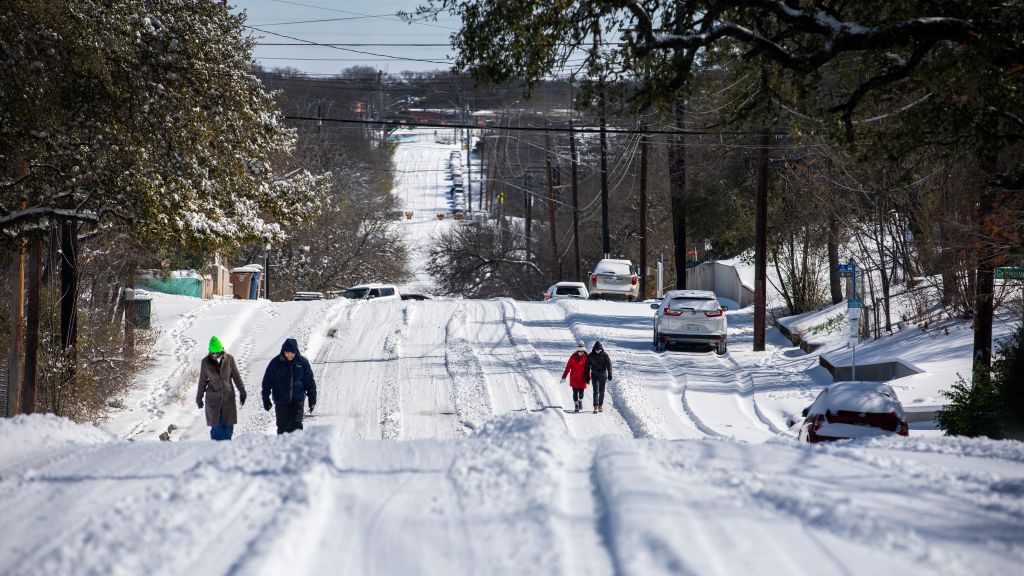
Lorena O'Neil is a reporter and photojournalist based in New Orleans covering reproductive health, gender, culture, and politics. She has written for The Atlantic, Elle, Esquire, Jezebel, and NPR.
-
 Tyla's Coachella Outfit Pairs Dolce & Gabbana With Pandora
Tyla's Coachella Outfit Pairs Dolce & Gabbana With PandoraThe singer wore a gold version of the crystal bra made famous by Aaliyah.
By Amy Mackelden Published
-
 How Kate Middleton Is Influencing George's Fashion Choices
How Kate Middleton Is Influencing George's Fashion ChoicesThe future king's smart blazer is straight out of Princess Kate's style playbook.
By Amy Mackelden Published
-
 King Charles "Couldn't" Meet Prince Harry During U.K. Visit
King Charles "Couldn't" Meet Prince Harry During U.K. Visit"It could actually bring down a court case."
By Amy Mackelden Published
-
 Senator Klobuchar: "Early Detection Saves Lives. It Saved Mine"
Senator Klobuchar: "Early Detection Saves Lives. It Saved Mine"Senator and breast cancer survivor Amy Klobuchar is encouraging women not to put off preventative care any longer.
By Senator Amy Klobuchar Published
-
 I'm an Egg Donor. Why Was It So Difficult for Me to Tell People That?
I'm an Egg Donor. Why Was It So Difficult for Me to Tell People That?Much like abortion, surrogacy, and IVF, becoming an egg donor was a reproductive choice that felt unfit for society’s standards of womanhood.
By Lauryn Chamberlain Published
-
 The 20 Best Probiotics to Keep Your Gut in Check
The 20 Best Probiotics to Keep Your Gut in CheckGut health = wealth.
By Julia Marzovilla Published
-
 Simone Biles Is Out of the Team Final at the Tokyo Olympics
Simone Biles Is Out of the Team Final at the Tokyo OlympicsShe withdrew from the event due to a medical issue, according to USA Gymnastics.
By Rachel Epstein Published
-
 The Truth About Thigh Gaps
The Truth About Thigh GapsWe're going to need you to stop right there.
By Kenny Thapoung Published
-
 The High Price of Living With Chronic Pain
The High Price of Living With Chronic PainThree women open up about how their conditions impact their bodies—and their wallets.
By Alice Oglethorpe Published
-
 I Used to Imagine Murdering the Men I Dated
I Used to Imagine Murdering the Men I DatedFalling in love helped me finally figure out why.
By Jessica Amento Published
-
 60 Workout Apps for Women Who Want Results (Without a Gym Membership)
60 Workout Apps for Women Who Want Results (Without a Gym Membership)Buying Guide Easy fitness plans you can follow without fear of judgment.
By Bianca Rodriguez Published